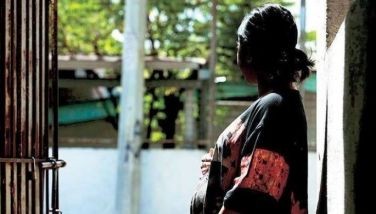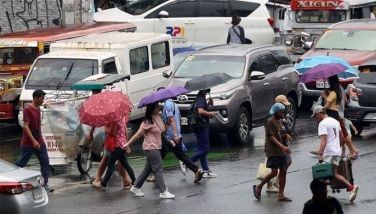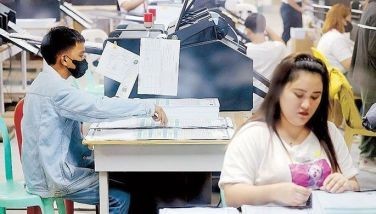Life slowly returns to normal in Albay, but rebuilding may take years
December 7, 2006 | 12:00am
Shops are reopening and telephone lines are back up, but reconstruction in the impoverished province of Albay after deadly mudflows could take years, officials said.
President Arroyo, who made a flying visit here Tuesday, ordered a massive effort to get the devastated areas back on their feet before Christmas.
The President earlier declared a state of national calamity and ordered the release of P1 billion to hardest-hit areas in Bicol, owing to the unprecedented three successive super typhoons that plowed into the country in the last three months.
"It appears that the best option is the permanent evacuation of all the families living within the hazard zones of Mayon volcano," Press Secretary Ignacio Bunye said.
"We cannot allow the threat of such a tragic incident to hover endlessly over thousands of people who are obviously in danger every time a weather disturbance hits the area."
Bunye said Mrs. Arroyo considers the tragedy that struck Albay as "another painful lesson" that calls for clear-cut decisions to minimize casualties every time a disaster strikes the country.
But work in rehabilitating Albay has been painfully slow, with public works staff and many government employees directly affected by the tragedy.
Power and water services have yet to be restored, with kilometers of toppled power lines littering the roadsides.
Malacañang has approved the release of some P390 million for the restoration of power distribution lines in Bicol.
"The release of the said fund from the Calamity fund of the Office of President will enable us to meet the target of energizing the Daraga-Albay substation by Dec. 16," Energy Secretary Raphael Lotilla said.
Lotilla said the National Electrification Administration (NEA) has fielded out teams of engineers and volunteers to help in the restoration of the damaged power lines particularly those covered by the electric cooperatives to restore electricity in the household level.
On the other hand, work on the damaged airport terminal in Albay has yet to begin, as massive military aircraft arrived with much-needed relief aid.
"This will take several years to get us fully functioning again," Albay Gov. Fernando Gonzales said.
Gonzales pointed out the vast tracts of land planted with coconut, the province’s main agricultural product, are now covered in volcanic debris.
"There needs to be a comprehensive plan and a fresh approach in rebuilding," he said, adding that the local government could prevent people and businesses from building close to the Mayon volcano in the future.
Rising to 2,462 meters (8,125 feet) and beautifully symmetrical, the active Mayon has for years been a tourist attraction, and shops and villages have sprung up on its slopes despite the danger.
A powerful typhoon, Reming, last week dumped heavy rains over Albay, dislodging thousands of tons of volcanic ash and rocks from its slopes. The debris buried over 700 villages, leaving more than 1,200 people dead or missing.
The National Disaster Coordinating Council (NDCC) said 17 bodies have been recovered yesterday at the slopes of Mayon.
The retrieval of 17 more bodies added the total number of fatalities to 543, the NDCC said.
The NDCC reported that 740 persons are still missing while 76,247 people have been reported injured.
The Office of the Civil Defense (OCD) said the disaster destroyed or damaged 250,000 houses and affected 1.54 million people, nearly 83,000 of whom had sought refuge at evacuation centers.
Damage to buildings, infrastructure and agriculture is estimated at P1.2 billion.
"The magnitude of the disaster is so huge that even our economy will be affected for years," Gonzales said.
The coconut industry, which fuels the local economy, could take about seven years to recover. About 30 percent of the land destroyed by the volcanic debris was planted with millions of coconuts that were already bearing fruit.
"It would take us about three years to replant and up to seven years before they can start bearing fruit again," he added.
"Some of the villages that were buried were not in the slopes. So this was a phenomenon that in a way was not anticipated," the governor said.
Gonzales said those affected would not be allowed to rebuild and should be relocated.
NDCC chairman Glenn Rabonza said work in the coming days will be focused on clearing debris and restoring road links to isolated villages.
Supplies now are either flown in or taken by boat to the nearby port of Tabaco, but getting them to affected areas is a problem.
"The most important thing now is that no community is left isolated and starving," Rabonza said.
Workers moved around the clock shifting tons of sand and volcanic rock yesterday to open up vital lifelines to Albay hamlets days after mudslides left more than 1,200 dead and missing.
Restoring roads, electricity and telephone networks to bring help to desperate survivors is now the priority after the worst-affected Bicol region recovered and buried its dead from super typhoon "Reming" (Durian).
In the village of Sto. Domingo on the outskirts of Legaspi City, machines excavated a road buried in sand and volcanic rocks the size of cars.
The earth mover machines were swiftly followed by military trucks bearing relief goods and buses packed with anxious people returning to their obliterated villages.
The OCD said most of Bicol still had no electricity.
It said the earliest target for restoring temporary power would be on Christmas eve, 18 days away. The cost for replacing the downed power pylons and lines was estimated at P795 million.
The OCR said the country had received pledges and deliveries of cash, tents, blankets, generators, water tanks and medicine from governments and charities around the world.
The government of Japan, through the Japan International Cooperation Agency (JICA), turned over to the Department of Social Welfare and Development (DSWD) P9 million worth of relief goods yesterday.
The relief goods consisted of 150 sets of tents that can each accommodate six people, 900 rolls of plastic sheets, 60 pieces of sleeping mattresses, and 20 sets of 220-volt generators with cable codes and adaptor plugs.
Singapore, for its part, has sent US$50,000 worth of relief supplies including medicines, food, blankets, and tents Tuesday.
Other countries including South Korea and Malaysia pledged help.
China also donated $200,000 to the government’s rescue and relief operations in Bicol.
Chinese Ambassador Li Jin Jun handed over the check to Foreign Secretary Alberto Romulo in simple ceremonies at the Department of Foreign Affairs (DFA) main office yesterday.
Romulo, in behalf of the Philippine government, expressed appreciation for the donation made by China.
Romulo said the Philippine government will "value and cherish the sympathy and support extended by the Chinese government and the Chinese people during such times of distress in our nation’s history."
The government of France, through Minister of Foreign Affairs Philippe Douste-Blazy, also provided support by donating 100,000 Euros, or P6.6 million aid.
The Philippine Airlines (PAL) announced its offer of free cargo space, up to 200 kilos, for its flights to Albay with priority on donations and relief goods.
PAL president and chief operating officer Jaime Bautista said the priority shipment of medicines will be on its flights to Bicol.
Bautista said the PAL Foundation has been tasked to coordinate the airline’s relief efforts and airlift operations to Bicol.
Manila International Airport Authority (MIAA) general manager Alfonso Cusi said he had tasked the airport authorities to immediately facilitate the processing of all relief goods from other countries coming into the country via commercial flights. – AFP, AP, Paolo Romero, Jaime Laude, Rainier Allan Ronda, Donnabelle Gatdula, Sandy Araneta, Nestor Etolle
President Arroyo, who made a flying visit here Tuesday, ordered a massive effort to get the devastated areas back on their feet before Christmas.
The President earlier declared a state of national calamity and ordered the release of P1 billion to hardest-hit areas in Bicol, owing to the unprecedented three successive super typhoons that plowed into the country in the last three months.
"It appears that the best option is the permanent evacuation of all the families living within the hazard zones of Mayon volcano," Press Secretary Ignacio Bunye said.
"We cannot allow the threat of such a tragic incident to hover endlessly over thousands of people who are obviously in danger every time a weather disturbance hits the area."
Bunye said Mrs. Arroyo considers the tragedy that struck Albay as "another painful lesson" that calls for clear-cut decisions to minimize casualties every time a disaster strikes the country.
But work in rehabilitating Albay has been painfully slow, with public works staff and many government employees directly affected by the tragedy.
Power and water services have yet to be restored, with kilometers of toppled power lines littering the roadsides.
Malacañang has approved the release of some P390 million for the restoration of power distribution lines in Bicol.
"The release of the said fund from the Calamity fund of the Office of President will enable us to meet the target of energizing the Daraga-Albay substation by Dec. 16," Energy Secretary Raphael Lotilla said.
Lotilla said the National Electrification Administration (NEA) has fielded out teams of engineers and volunteers to help in the restoration of the damaged power lines particularly those covered by the electric cooperatives to restore electricity in the household level.
On the other hand, work on the damaged airport terminal in Albay has yet to begin, as massive military aircraft arrived with much-needed relief aid.
"This will take several years to get us fully functioning again," Albay Gov. Fernando Gonzales said.
Gonzales pointed out the vast tracts of land planted with coconut, the province’s main agricultural product, are now covered in volcanic debris.
"There needs to be a comprehensive plan and a fresh approach in rebuilding," he said, adding that the local government could prevent people and businesses from building close to the Mayon volcano in the future.
Rising to 2,462 meters (8,125 feet) and beautifully symmetrical, the active Mayon has for years been a tourist attraction, and shops and villages have sprung up on its slopes despite the danger.
A powerful typhoon, Reming, last week dumped heavy rains over Albay, dislodging thousands of tons of volcanic ash and rocks from its slopes. The debris buried over 700 villages, leaving more than 1,200 people dead or missing.
The National Disaster Coordinating Council (NDCC) said 17 bodies have been recovered yesterday at the slopes of Mayon.
The retrieval of 17 more bodies added the total number of fatalities to 543, the NDCC said.
The NDCC reported that 740 persons are still missing while 76,247 people have been reported injured.
The Office of the Civil Defense (OCD) said the disaster destroyed or damaged 250,000 houses and affected 1.54 million people, nearly 83,000 of whom had sought refuge at evacuation centers.
Damage to buildings, infrastructure and agriculture is estimated at P1.2 billion.
"The magnitude of the disaster is so huge that even our economy will be affected for years," Gonzales said.
The coconut industry, which fuels the local economy, could take about seven years to recover. About 30 percent of the land destroyed by the volcanic debris was planted with millions of coconuts that were already bearing fruit.
"It would take us about three years to replant and up to seven years before they can start bearing fruit again," he added.
"Some of the villages that were buried were not in the slopes. So this was a phenomenon that in a way was not anticipated," the governor said.
Gonzales said those affected would not be allowed to rebuild and should be relocated.
NDCC chairman Glenn Rabonza said work in the coming days will be focused on clearing debris and restoring road links to isolated villages.
Supplies now are either flown in or taken by boat to the nearby port of Tabaco, but getting them to affected areas is a problem.
"The most important thing now is that no community is left isolated and starving," Rabonza said.
Workers moved around the clock shifting tons of sand and volcanic rock yesterday to open up vital lifelines to Albay hamlets days after mudslides left more than 1,200 dead and missing.
Restoring roads, electricity and telephone networks to bring help to desperate survivors is now the priority after the worst-affected Bicol region recovered and buried its dead from super typhoon "Reming" (Durian).
In the village of Sto. Domingo on the outskirts of Legaspi City, machines excavated a road buried in sand and volcanic rocks the size of cars.
The earth mover machines were swiftly followed by military trucks bearing relief goods and buses packed with anxious people returning to their obliterated villages.
The OCD said most of Bicol still had no electricity.
It said the earliest target for restoring temporary power would be on Christmas eve, 18 days away. The cost for replacing the downed power pylons and lines was estimated at P795 million.
The government of Japan, through the Japan International Cooperation Agency (JICA), turned over to the Department of Social Welfare and Development (DSWD) P9 million worth of relief goods yesterday.
The relief goods consisted of 150 sets of tents that can each accommodate six people, 900 rolls of plastic sheets, 60 pieces of sleeping mattresses, and 20 sets of 220-volt generators with cable codes and adaptor plugs.
Singapore, for its part, has sent US$50,000 worth of relief supplies including medicines, food, blankets, and tents Tuesday.
Other countries including South Korea and Malaysia pledged help.
China also donated $200,000 to the government’s rescue and relief operations in Bicol.
Chinese Ambassador Li Jin Jun handed over the check to Foreign Secretary Alberto Romulo in simple ceremonies at the Department of Foreign Affairs (DFA) main office yesterday.
Romulo, in behalf of the Philippine government, expressed appreciation for the donation made by China.
Romulo said the Philippine government will "value and cherish the sympathy and support extended by the Chinese government and the Chinese people during such times of distress in our nation’s history."
The government of France, through Minister of Foreign Affairs Philippe Douste-Blazy, also provided support by donating 100,000 Euros, or P6.6 million aid.
The Philippine Airlines (PAL) announced its offer of free cargo space, up to 200 kilos, for its flights to Albay with priority on donations and relief goods.
PAL president and chief operating officer Jaime Bautista said the priority shipment of medicines will be on its flights to Bicol.
Bautista said the PAL Foundation has been tasked to coordinate the airline’s relief efforts and airlift operations to Bicol.
Manila International Airport Authority (MIAA) general manager Alfonso Cusi said he had tasked the airport authorities to immediately facilitate the processing of all relief goods from other countries coming into the country via commercial flights. – AFP, AP, Paolo Romero, Jaime Laude, Rainier Allan Ronda, Donnabelle Gatdula, Sandy Araneta, Nestor Etolle
BrandSpace Articles
<
>
- Latest
- Trending
Trending
Latest
Trending
Latest
Recommended































